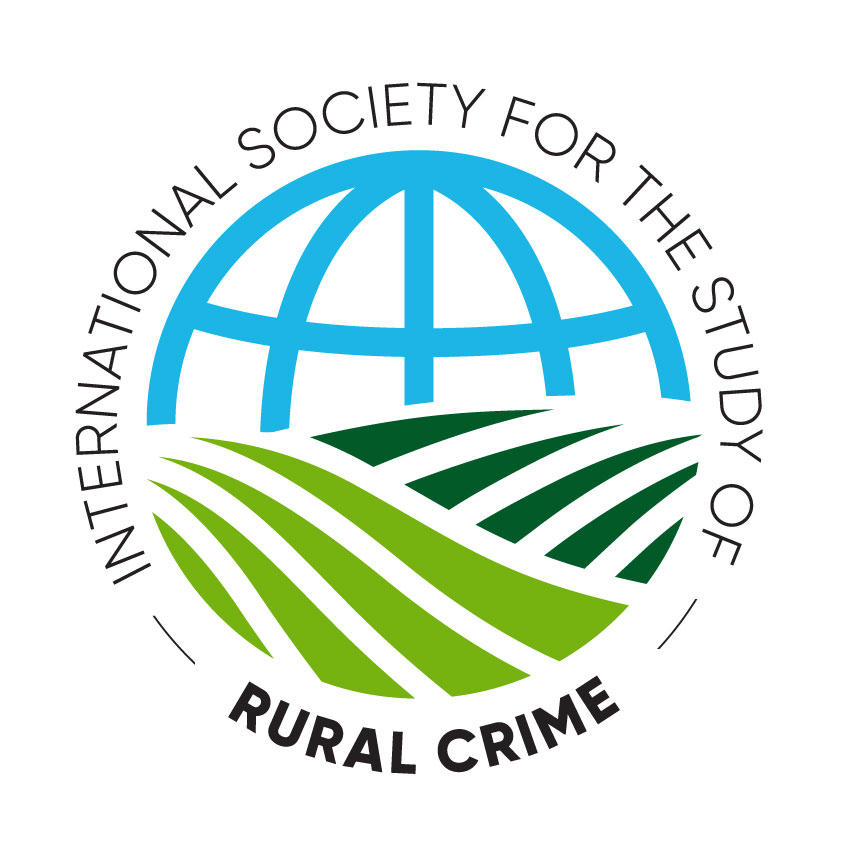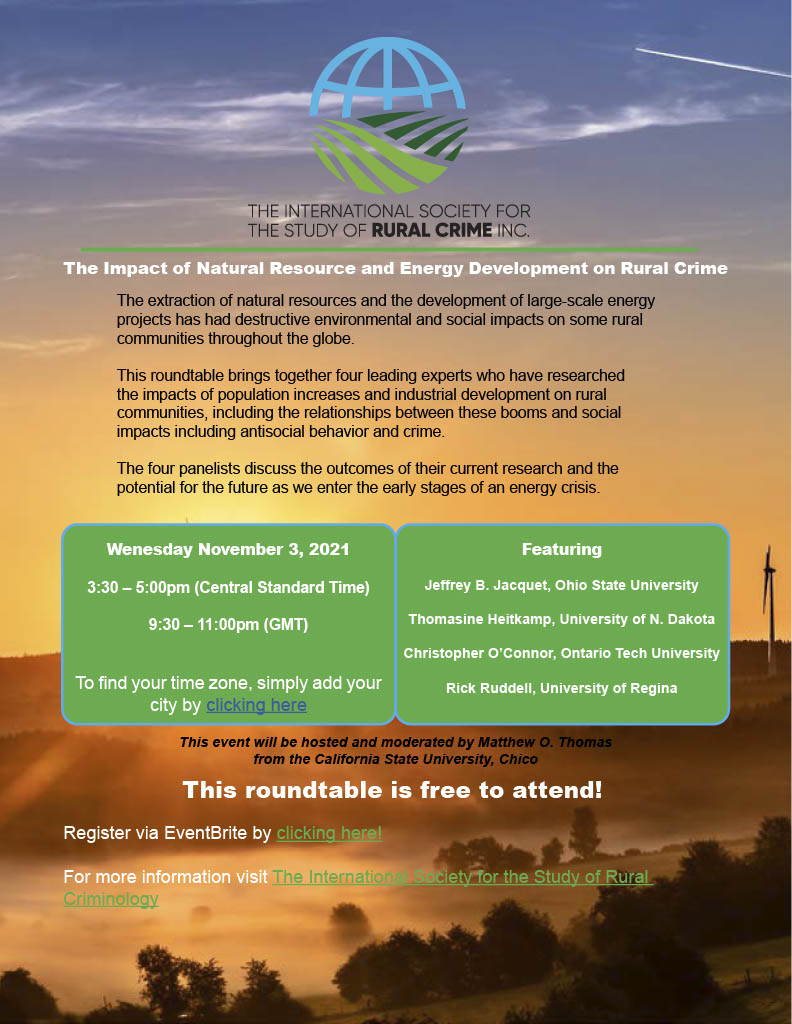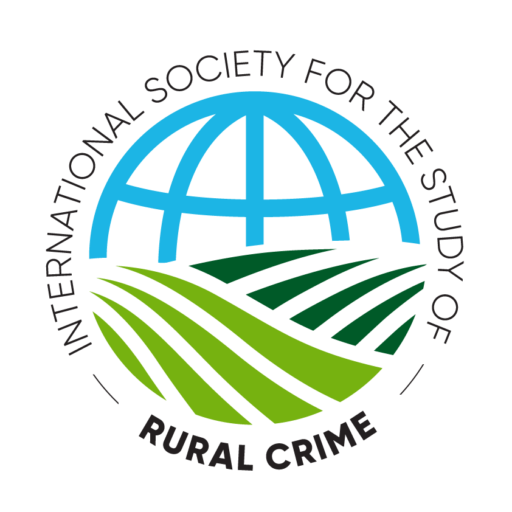ISSRC Blog
This blog provides an opportunity for pithy observations or reflections on topical rural crime news and developments, a summary of research, promotion of publications, advertisements for upcoming events… and more! If you would like to contribute, email a submission of no more than 500 words to admin@issrc.net
Vale Rick Ruddell
 Professor Rick Ruddell was a founding member of the International Society for the Study of Rural Crime.
Professor Rick Ruddell was a founding member of the International Society for the Study of Rural Crime.
A professor at the University of Regina in Canada, Rick was also the Law Foundation of Saskatchewan Chair in Police Studies.
He served on the Executive of our Society from its inception in 2019 until 2022. Rick passed away on 2 January 2023.
And he is very sadly missed.
Rick published very extensively: more than 130 peer-reviewed articles and other scholarly outputs; he edited or co-authored 14 books.
He was always available for media commentary – just before his passing, for instance, he spoke of the need to take longer-term views of homicide statsitics. And he was known to host “ask me anything” sessions on Reddit, a classic example of how he would adeptly bridge the divide between academia and the wider community.
A member of the International Journal of Rural Criminology‘s Editorial Advisory Board, Rick cheerily and promptly would provide sound and helpful blind peer reviews… authors of articles published will not know whether he contributed to improving their publication, but he certainly did. On one occasion recently, when asked if he could oblige yet again, his only condition was the shouting of a beer when one of the editors might next be in Saskatachewan.
Above all else, Rick was a terrific person and a fabulous mentor to many.
Rick leaves an impressive legacy, as both a scholar and a person – in particular in the field of rural criminology, in which he is easily considered a pioneer especially with his research into rural boom and bust economies. His very impressive book, Oil, gas and boomtowns is but one example. In 2022, Rick organised and presented a virtual roundtable on this topic for the Society – his own contribution commences at 37:45.
The President and Vice-Chancellor of the University of Regina, Jeff Keshen, offers a few more words in tribute to our dear friend and colleague Rick.
A longer tribute to Rick from the rural criminology community will be forthcoming and published both here and in other places.
Vale Rick Ruddell.
OUTSTANDING WINNERS OF AWARDS PROGRAM ANNOUNCED
The International Society for the Study of Rural Crime (ISSRC) is made up of scholars, students and practitioners from around the world with an interest in research aimed at reducing the scourge of crime in all its forms in rural areas.
The Society launched its annual awards program in 2020, offering awards in three categories.
- The Joseph F. Donnermeyer New Scholar Award
- The ISSRC Research Student Award
- The ISSRC Policy, Practice and Engagement Award
The President of the Society, Emeritus Professor Joseph F. Donnermeyer, said the field of applications for each award category in 2021 was very strong.
“The judging panels had their work cut out this year”, Professor Donnermeyer said.
“Applications were of a very high calibre, showing that the future of the Society and of rural crime studies is in excellent hands.
“I was impressed with the innovative ways which applicants are thinking about how we can tackle crime in rural places – both in a scholarly way but also important practically as well.
“It’s one thing to sit at a desk putting thoughts to paper. It’s another thing altogether to think cleverly as to how these ideas can help shift policy and practice.
“On behalf of the Society’s membership, hearty congratulations and hats off to the three 2021 award recipients!”, Professor Donnermeyer said.
Winners receive a certificate, a cash prize and a book voucher kindly dontaed by Britsol University Press.


The 2021 ‘Joseph F. Donnermeyer New Scholar Award’ is presented to:
Dr Tarah Hodgkinson, Wilfrid Laurier University, Ontario, Canada.
Tarah is a very productive scholar, and has written rural-focused articles in both an Australian and Canadian context. She has an impressive track record, with 25 journal articles, 6 book chapters and 11 other publications. She has also received international awards, showing her impact and reputation on this level. Her funding to date is also noteworthy.
In the co-authored article she submitted, Tarah identifies a research and evidence deficit in the topic studied; fear of crime in non-urban contexts. She talks about contributing factors such as neglect of the rural in research and the myth of rural idyll, and points to need to examine rural, including in relation to differences in crime decline. Overall, there is a clear contribution to rural criminology (and there are both research and practice implications and contributions) and she is an incredible early career researcher.
The panel was able to see how Tarah’s work has not only made an impact as an academic but also in the applied sense as a crime prevention practitioner.
The 2021 ISSRC Research Student Award is presented to:
Cecili Doorewaard, University of South Africa
The panel was unanimous in their decision of awarding Cecili the ISSRC Research Student Award for 2021. The Research Student Award is given to research student (Honours / Masters / PhD student) for a sole-authored piece of writing associated with their research (unpublished or published) in rural criminology.
While all of the applications produced excellent work, Cecili’s research stood out in large part due to its novelty, depth of insight and, ultimately, significant contribution to the field of rural criminology. Specifically, her study explored, describe and explained the criminal behaviour associated with livestock-theft. While farm crime is a field with a relatively healthy empirical basis, very little is known about the perpetrators of these crimes themselves. Cecili’s work therefore provides new insight into offender characteristics, modus operandi and motive.
Importantly, Cecili took these findings and considered them in the context of criminological theory to help explain the how and why of livestock theft, and what drives offenders to commit such acts. Needless to say, such information is valuable from the perspective of policy and practice. To this end, Cecili also drew on these important findings to make a number of key recommendations to enable the criminal justice system and livestock owners to tackle live-stock theft. In short, this work deserves to be recognised and awarded and rural criminologists more broadly would do well to follow Cecili’s lead and consider criminal behaviour associated with livestock-theft from a comparative international perspective.
The 2021 ISSRC Policy, Practice and Engagement Award is presented to:
The New South Wales Police Force Rural Crime Prevention Team (Led by Det Insp Cameron Whiteside)
In aggregate, the NSW Rural Crime team is outwardly focussed, such as with their involvement with student learning, engagement with academia, interactions with farmers and so on. They have developed a clear leadership role in Australia and New Zealand, notably with the creation of a nationally accredited course, as well as the information booklet. Clear evidence is provided on a range of initiatives which are innovative and aimed at addressing rural crime in NSW (but with national/international potential as well).
The team exemplifies the purpose of the Award – practical application from the law enforcement side that targets and aids potential victims in increasing security, works collaboratively with researchers and the educational environment (outreach through teaching as well). The level of innovation has made them a leader in Australia – policy, practice, and engagement all.
Roundtable alert! The Impact of Natural Resources & Energy Development on Rural Crime
The International Society for the Study of Rural Crime – @RuCrimSociety – invites you to this virtual roundtable! The focus will be on “The Impact of Natural Resources & Energy Development on Rural Crime”.
The roundtable is free to attend.
Register via EventBrite:
Check the time and date for the event in your locaton here: https://www.timeanddate.com/worldclock/converter.html?iso=20211103T213000&p1=210&p2=tz_gmt
Interested in joining the ISSRC? Visit https://issrc.net/join-now/
Download the flier
About this event
The extraction of natural resources and the development of large-scale energy projects has had destructive environmental and social impacts on some rural communities throughout the globe.
This roundtable brings together four leading experts who have researched the impacts of population increases and industrial development on rural communities, including the relationships between these booms and social impacts including antisocial behavior and crime.
The four panelists discuss the outcomes of their current research and the potential for the future as we enter the early stages of an energy crisis.
They respond to two key questions:
- What are the impacts of natural resource and energy development on rural crime?
- What can be done about this issue?
Ample opportunity will be provided for attendees to engage with the panel.
Featuring
Moderator – Dr Matt Thomas
Professor, California State University, Chico
 Dr Thomas received a BA from St. Joseph’s University, and an MA and PhD from the University of Maryland, College Park. He teaches political science, criminal justice, and public administration in the department’s undergraduate and graduate programs. He is the coordinator of the MA in Political Science program, and is the internship coordinator for the MPA program. His research focuses on both urban politics, including work on New Orleans (Reforming New Orleans: The Contentious Politics of Change in the Big Easy with Peter Burns, Cornell Press), and on criminal justice topics, including work on police strength, concealed weapons on campus, and the impacts of AB 109 and Prop 47 on California’s criminal justice realignment agenda. Matt received the university’s Outstanding Service Award in 2016-17.
Dr Thomas received a BA from St. Joseph’s University, and an MA and PhD from the University of Maryland, College Park. He teaches political science, criminal justice, and public administration in the department’s undergraduate and graduate programs. He is the coordinator of the MA in Political Science program, and is the internship coordinator for the MPA program. His research focuses on both urban politics, including work on New Orleans (Reforming New Orleans: The Contentious Politics of Change in the Big Easy with Peter Burns, Cornell Press), and on criminal justice topics, including work on police strength, concealed weapons on campus, and the impacts of AB 109 and Prop 47 on California’s criminal justice realignment agenda. Matt received the university’s Outstanding Service Award in 2016-17.
Panelist – Dr Jeffrey B. Jacquet
Associate Professor, Ohio State University (Ohio, United States)
 Dr Jacquet is an Associate Professor of Rural Sociology in the School of Environment and Natural Resources at The Ohio State University in Columbus, Ohio, USA. One of the first to study the community-level implications of hydraulic fracturing, Dr Jacquet has gone on to examine the social ramifications of a range of renewable- and non-renewable-energy systems at institutions including the University of Wyoming, Cornell University, and South Dakota State University. At Ohio State, Jacquet leads students through coursework, research, and mentorship to examine the areas of energy, environment, and rural societies. He is the lead editor of a new collected volume titled Energy Impacts: A Multidisciplinary Exploration of North American Energy Development published in 2021 by the University Press of Colorado.
Dr Jacquet is an Associate Professor of Rural Sociology in the School of Environment and Natural Resources at The Ohio State University in Columbus, Ohio, USA. One of the first to study the community-level implications of hydraulic fracturing, Dr Jacquet has gone on to examine the social ramifications of a range of renewable- and non-renewable-energy systems at institutions including the University of Wyoming, Cornell University, and South Dakota State University. At Ohio State, Jacquet leads students through coursework, research, and mentorship to examine the areas of energy, environment, and rural societies. He is the lead editor of a new collected volume titled Energy Impacts: A Multidisciplinary Exploration of North American Energy Development published in 2021 by the University Press of Colorado.
Panelist – Dr Christopher O’Connor
Associate Professor, University of Ontario Institute of Technology (Ontario, Canada)
 Dr O’Connor is an Associate Professor of Criminology at Ontario Tech University. He received his PhD in Sociology from the University of Calgary where he studied school-to-work transitions and perceptions of crime in the energy boomtown of Fort McMurray, Alberta. His research examines energy resource boomtowns, people’s use and perceptions of emerging technology, policing, and young people’s participation in crime, perceptions of the environment, and school-to-work transitions. Dr O’Connor has recently completed a SSHRC Insight Development Grant examining the risks and opportunities of hydraulic fracturing and related renewable and non-renewable energy technologies. He is currently co-director on a SSHRC-funded Partnership Development grant examining facial recognition use by the police which involves working with a range of multi-disciplinary stakeholders to examine the viability of the technology for police use.
Dr O’Connor is an Associate Professor of Criminology at Ontario Tech University. He received his PhD in Sociology from the University of Calgary where he studied school-to-work transitions and perceptions of crime in the energy boomtown of Fort McMurray, Alberta. His research examines energy resource boomtowns, people’s use and perceptions of emerging technology, policing, and young people’s participation in crime, perceptions of the environment, and school-to-work transitions. Dr O’Connor has recently completed a SSHRC Insight Development Grant examining the risks and opportunities of hydraulic fracturing and related renewable and non-renewable energy technologies. He is currently co-director on a SSHRC-funded Partnership Development grant examining facial recognition use by the police which involves working with a range of multi-disciplinary stakeholders to examine the viability of the technology for police use.
Panelist – Professor Thomasine Heitkamp
Emeritus Faculty and LCSW, University of North Dakota (North Dakota, USA)
 Professor Heitkamp served as a faculty member at the University of North Dakota for 39 years, achieving the highest rank of Chester Fritz Distinguished Professor. She is currently an Emeritus faculty and a Licensed Clinical Social Worker in North Dakota. She also serves as a Behavioral Health Research Specialists for the University of North Dakota – Office of Research and Economic Development. Professor Heitkamp served as Co-PI for a National Institute of Justice-funded three-year study to examine the impact of oil development on inter-personal violence in the Bakken Oil fields of North Dakota and Montana. She has served as the PI on several large grant-funded projects including her service as PI and Co-Director of the Mountain Plains Mental Health Technology Transfer Center and Addiction Technology Transfer Center (ATTC). She has published in a host of peer-reviewed journals with a focus on workforce development serving tribal and rural communities.
Professor Heitkamp served as a faculty member at the University of North Dakota for 39 years, achieving the highest rank of Chester Fritz Distinguished Professor. She is currently an Emeritus faculty and a Licensed Clinical Social Worker in North Dakota. She also serves as a Behavioral Health Research Specialists for the University of North Dakota – Office of Research and Economic Development. Professor Heitkamp served as Co-PI for a National Institute of Justice-funded three-year study to examine the impact of oil development on inter-personal violence in the Bakken Oil fields of North Dakota and Montana. She has served as the PI on several large grant-funded projects including her service as PI and Co-Director of the Mountain Plains Mental Health Technology Transfer Center and Addiction Technology Transfer Center (ATTC). She has published in a host of peer-reviewed journals with a focus on workforce development serving tribal and rural communities.
Panelist – Dr Rick Ruddell
Professor, University of Regina (Saskatchewan , Canada)
 Dr Ruddell serves as the Law Foundation of Saskatchewan Chair in Police Research at the University of Regina, Canada. Prior to this appointment he served as Director of Operational Research with the Correctional Service of Canada, and held faculty positions at Eastern Kentucky University and the California State University, Chico. Prior to his academic career, he served with the Saskatchewan Ministry of Corrections, Public Safety and Policing as a supervisor and manager. Dr Ruddell’s research has focused upon policing, criminal justice policy, and juvenile justice, and he has published over 150 articles and technical reports. He has written extensively about the impact of natural resource booms on rural communities and published Oil, Gas, and Crime: The Dark Side of the Boomtown (Palgrave Macmillan) in 2017.
Dr Ruddell serves as the Law Foundation of Saskatchewan Chair in Police Research at the University of Regina, Canada. Prior to this appointment he served as Director of Operational Research with the Correctional Service of Canada, and held faculty positions at Eastern Kentucky University and the California State University, Chico. Prior to his academic career, he served with the Saskatchewan Ministry of Corrections, Public Safety and Policing as a supervisor and manager. Dr Ruddell’s research has focused upon policing, criminal justice policy, and juvenile justice, and he has published over 150 articles and technical reports. He has written extensively about the impact of natural resource booms on rural communities and published Oil, Gas, and Crime: The Dark Side of the Boomtown (Palgrave Macmillan) in 2017.

